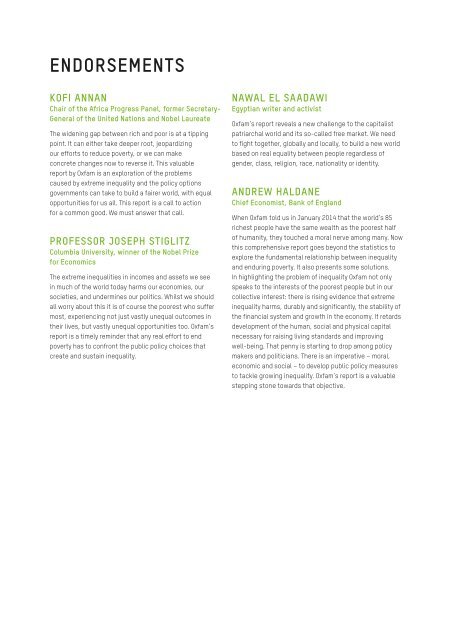1FW2e8F
1FW2e8F
1FW2e8F
Create successful ePaper yourself
Turn your PDF publications into a flip-book with our unique Google optimized e-Paper software.
ENDORSEMENTS<br />
KOFI ANNAN<br />
Chair of the Africa Progress Panel, former Secretary-<br />
General of the United Nations and Nobel Laureate<br />
The widening gap between rich and poor is at a tipping<br />
point. It can either take deeper root, jeopardizing<br />
our efforts to reduce poverty, or we can make<br />
concrete changes now to reverse it. This valuable<br />
report by Oxfam is an exploration of the problems<br />
caused by extreme inequality and the policy options<br />
governments can take to build a fairer world, with equal<br />
opportunities for us all. This report is a call to action<br />
for a common good. We must answer that call.<br />
PROFESSOR JOSEPH STIGLITZ<br />
Columbia University, winner of the Nobel Prize<br />
for Economics<br />
The extreme inequalities in incomes and assets we see<br />
in much of the world today harms our economies, our<br />
societies, and undermines our politics. Whilst we should<br />
all worry about this it is of course the poorest who suffer<br />
most, experiencing not just vastly unequal outcomes in<br />
their lives, but vastly unequal opportunities too. Oxfam’s<br />
report is a timely reminder that any real effort to end<br />
poverty has to confront the public policy choices that<br />
create and sustain inequality.<br />
NAWAL EL SAADAWI<br />
Egyptian writer and activist<br />
Oxfam’s report reveals a new challenge to the capitalist<br />
patriarchal world and its so-called free market. We need<br />
to fight together, globally and locally, to build a new world<br />
based on real equality between people regardless of<br />
gender, class, religion, race, nationality or identity.<br />
ANDREW HALDANE<br />
Chief Economist, Bank of England<br />
When Oxfam told us in January 2014 that the world’s 85<br />
richest people have the same wealth as the poorest half<br />
of humanity, they touched a moral nerve among many. Now<br />
this comprehensive report goes beyond the statistics to<br />
explore the fundamental relationship between inequality<br />
and enduring poverty. It also presents some solutions.<br />
In highlighting the problem of inequality Oxfam not only<br />
speaks to the interests of the poorest people but in our<br />
collective interest: there is rising evidence that extreme<br />
inequality harms, durably and significantly, the stability of<br />
the financial system and growth in the economy. It retards<br />
development of the human, social and physical capital<br />
necessary for raising living standards and improving<br />
well‐being. That penny is starting to drop among policy<br />
makers and politicians. There is an imperative – moral,<br />
economic and social – to develop public policy measures<br />
to tackle growing inequality. Oxfam’s report is a valuable<br />
stepping stone towards that objective.


